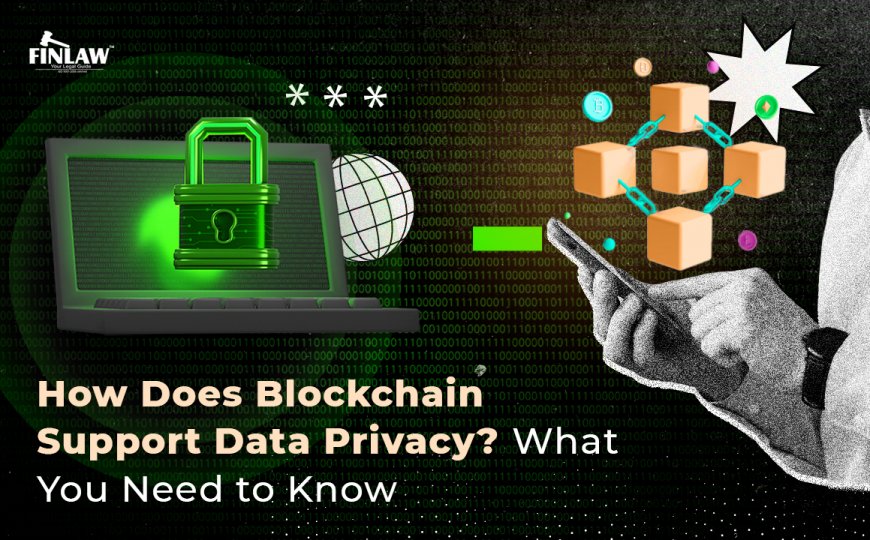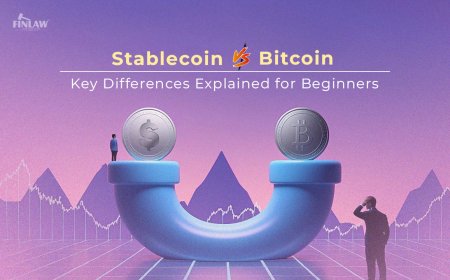How Does Blockchain Support Data Privacy? What You Need to Know
Discover how blockchain supports data privacy through decentralization, encryption, and smart contracts under the DPDP Act 2023.

In today's digital age, data privacy has become a paramount concern, especially in India, where the proliferation of digital services has led to increased data generation and sharing. With the enactment of the Digital Personal Data Protection Act (DPDP) 2023, there's a heightened focus on safeguarding personal information. Blockchain technology, known for its decentralized and secure nature, offers promising solutions to enhance data privacy. This article explores how blockchain supports data privacy, its applications in the Indian context, and the challenges and opportunities it presents.
Understanding Blockchain and Its Privacy Features
To understand how blockchain supports data privacy, it's essential to grasp its foundational characteristics. Blockchain is a decentralized ledger technology that records transactions across a network of computers. Its inherent features contribute significantly to data privacy:
-
Decentralization: Eliminates the need for a central authority, reducing single points of failure and potential data breaches.
-
Immutability: Once data is recorded, it cannot be altered without consensus, ensuring data integrity.
-
Transparency with Pseudonymity: While transactions are transparent, users operate under pseudonymous addresses, protecting personal identities.
Key Blockchain Features Enhancing Data Privacy
1. Advanced Cryptographic Techniques
One of the most important answers to the question "how does blockchain support data privacy" lies in its use of cryptographic technologies:
-
Public and Private Keys: Each user has a cryptographic key pair. The public key is shared openly, while the private key remains confidential, ensuring secure access to data.
-
Digital Signatures: Authenticate transactions, ensuring that data originates from verified sources and hasn't been tampered with.
-
Hash Functions: Convert data into fixed-size strings, making it nearly impossible to reverse-engineer the original information.
2. Selective Data Disclosure
Blockchain enables users to control what data they share and with whom, which is a core way blockchain supports data privacy:
-
Smart Contracts: Self-executing contracts automate data sharing, ensuring that only necessary information is disclosed.
-
Zero-Knowledge Proofs (ZKPs): Allow parties to prove the validity of a statement without revealing the underlying data, further securing user privacy.
3. Decentralized Identity (DID)
Blockchain-based identity systems exemplify how blockchain supports data privacy by giving individuals control over their data:
-
Self-Sovereign Identity (SSI): Empowers users to manage their identities and credentials independently.
-
Verifiable Credentials: Provide cryptographically secure proof of identity or other claims without exposing sensitive data.
Real-World Applications in India: Blockchain and Data Privacy
India's diverse sectors offer numerous examples of how blockchain supports data privacy in practical settings:
1. Healthcare
-
Secure Medical Records: Blockchain secures patient data, ensuring it's tamper-proof and accessible only to authorized personnel.
-
Consent Management: Patients can use blockchain to grant or revoke access to their data, aligning with Indian data privacy regulations.
2. Banking and Finance
-
KYC Sharing: Blockchain allows banks to securely share KYC information, reducing duplication and improving privacy.
-
Fraud Detection: Immutable transaction histories help in identifying and mitigating fraudulent activities.
3. Supply Chain Management
-
Product Authentication: Blockchain ensures product integrity, enhancing trust.
-
Confidential Operations: Sensitive supplier or logistical information remains private while still traceable.
4. Government Services
-
Land Records: Blockchain prevents tampering with property records.
-
Digital Identity: Supports privacy-centric identity verification for government schemes and services.
Blockchain and India's Digital Personal Data Protection Act (DPDP) 2023
To understand how blockchain supports data privacy in India, we must examine its alignment with the DPDP Act:
-
Consent-Driven Architecture: Smart contracts automate user consent management, a key requirement of the DPDP Act.
-
Data Minimization: Blockchain ensures only necessary data is shared.
-
Purpose Limitation: Data is accessed and used strictly for the purposes agreed upon by the user.
Challenges remain, such as:
-
Right to Erasure: Blockchain’s immutability can conflict with an individual’s right to delete personal data.
-
Data Localization: The decentralized and borderless nature of blockchain may complicate data localization mandates.
Challenges in Using Blockchain for Data Privacy
Despite its benefits, there are technical and regulatory hurdles in adopting blockchain for privacy:
-
Scalability Issues: Large networks may suffer from slower transaction speeds.
-
Interoperability: Compatibility with existing IT systems is still evolving.
-
Public vs. Private Blockchain Dilemma: Balancing transparency and confidentiality remains a key challenge.
-
Legal Uncertainty: Blockchain's alignment with evolving data protection laws must be continually assessed.
The Future of Blockchain and Data Privacy in India
Looking ahead, how blockchain supports data privacy will become even more evident as innovation grows. Key trends include:
-
Enhanced Cryptographic Tools: Zero-knowledge proofs and homomorphic encryption can offer new ways to protect privacy.
-
Regulatory Sandboxes: These allow startups to test blockchain solutions under regulatory oversight.
-
Public-Private Partnerships: Collaboration can help scale secure and privacy-compliant blockchain systems.
Conclusion
Understanding how blockchain supports data privacy is critical in today’s digital ecosystem. Blockchain provides decentralization, cryptographic security, and user empowerment—three pillars essential for protecting personal data. In India, where data privacy laws like the DPDP Act are reshaping digital governance, blockchain could play a transformative role. While challenges such as immutability vs. data deletion persist, the benefits of blockchain in enhancing privacy make it a compelling solution across industries.
Frequently Asked Questions (FAQs)
Q1: How does blockchain support data privacy?
Blockchain supports data privacy through decentralization, cryptographic security, smart contracts, and identity control mechanisms like DID and ZKPs.
Q2: Can blockchain comply with data privacy laws like the DPDP Act?
Yes, blockchain aligns with many privacy principles, but compliance challenges like data erasure and localization must be addressed.
Q3: What are some examples of how blockchain supports data privacy in India?
Use cases include healthcare data management, secure KYC sharing in banking, tamper-proof land records, and decentralized identity solutions.
Q4: What are the limitations of blockchain in supporting data privacy?
Limitations include immutability issues, scalability challenges, regulatory ambiguity, and interoperability concerns.
Q5: Why is it important to understand how blockchain supports data privacy?
Understanding this helps organizations and individuals make informed choices about secure data management in compliance with legal standards.
What's Your Reaction?



















